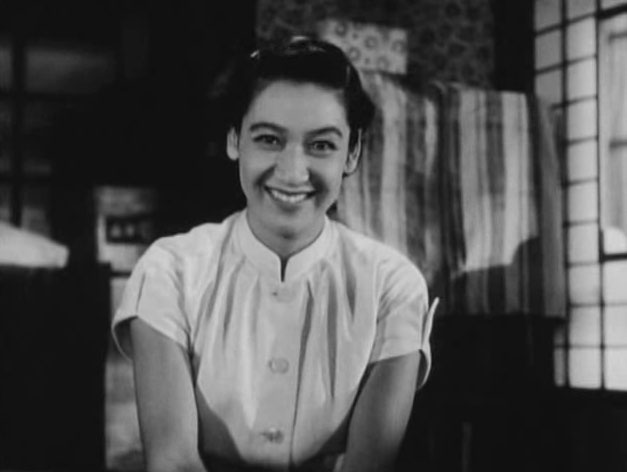|

Tokyo
Story - Noriko's Smile
By Doron B. Cohen (Kyoto,
Japan)
This
is the third in what became known as "the
Noriko trilogy": three films in which Hara
Setsuko plays a different young woman called "Noriko".
These are Late Spring (1949), Early
Summer (1951), and Tokyo Story (1953)
(in between came two other films in which Hara
did not participate). In all three films she plays
a "modern" young woman: dressed in western
cloths (while the slightly older women around
her usually wear kimono), works in an office
of a large company in Tokyo, and seems confident
and self-reliant. In the first two films she turns
out to be a little more traditional than expected:
in Late Spring she agrees to an arranged
marriage, in spite of her personal preferences;
in Early Summer she displays independence
by choosing her spouse against her family's wishes,
but in fact she marries the boy next door, preferring
going to the backward countryside with a poor
doctor she likes, over life in the modern city
with a rich businessman she doesn't trust. In
Tokyo Story it is the other way around:
she seems extremely traditional to begin with,
loyal beyond measure to her old parents-in-law,
but she eventually confesses to being selfish,
no longer thinking constantly about her dead husband
but rather about her own life and what would become
of it.
Tokyo Story is usually regarded as Ozu's
greatest masterpiece or most representative film.
To those of us who know his films well, and regard
his entire oeuvre as one unity, it is probably
just one in a series of truly great films. Still,
one cannot deny the variety of deep human feelings
displayed in this particular film, as well as
the amazing performances by the whole wonderful
cast. Ryū Chishū gives here arguably
his greatest performance as the old father (about
twenty years older than his actual age at the
time; the actress who plays his wife in this film
played his mother in Early Summer two years
earlier), and Hara Setsuko too has one of her
most memorable roles. And Ozu, as always, keeps
surprising us with what he does and does not show.
For example, there are many train rides in the
story, but only one is actually shown, towards
the end of the film, when Noriko goes back to
Tokyo, after opening her heart to her father-in-law,
and receiving his blessing and encouragement to
start a new chapter in her life. While on the
train she takes out the watch that belonged to
her late mother-in-law and was given to her as
a memento; she opens the lid of the old-fashioned
watch, reflecting nostalgically on the past, and
then she closes the lid back, looking forward
to her life from now on. This is a very typical
conclusion to an Ozu film: every ending - even
one involving death - is another beginning.
While Noriko seems the paragon of filial piety,
the old couple's own children are depicted mostly
as the complete opposite: cold, selfish and self-absorbed.
But as with Noriko, the depiction is not totally
black or white. These grown-up children must fend
for themselves and their own families. The father's
old friend, when getting drunk, complains about
his own son, who had given up and would make no
effort to progress in life; Hirayama's children,
on the other hand, strive constantly: Kōichi
is dedicated to his patients, and Shige to her
business; they cannot let go. And they are not
emotionally sterile either; Shige even displays
true sorrow over her mother's death (although
one can't help wishing that she had been a little
nicer to her in life). The old parents conclude
that they are lucky since their children are better
than average, and although they may say so mostly
to comfort themselves, we can also see the grain
of truth in that statement.
Perhaps the parents-children relationship could
be explored from another angle as well. Shige
brings up childhood grievances: her mother embarrassed
her at school, and her father was often drunk.
Her current attitude may have something to do
with what she had to endure. Perhaps their son
and daughters-in-law are nicer to the old couple
because they did not have to grow up with them
as their own children did. As we know from every
culture and every period, families can be hell.
So while they are expected to treat their old
parents with respect, the grown-up children cannot
be expected to be totally free of the sediments
of the past.
Unfortunately, the original negative of Tokyo
Story was lost in a fire, and what we have
left are only second-rate copies. We shall therefore
never be able to enjoy this film in all its original
beauty. Still, as we watch it again and again,
many scenes linger in memory, and above all Noriko's
warm, accepting smile when speaking with her young
sister-in-law: Yes, life is disappointing, but
that is all we've got. Once again human reality
is reflected, both brilliantly and modestly, through
Ozu's incomparable art.
©
All rights reserved to the author
|